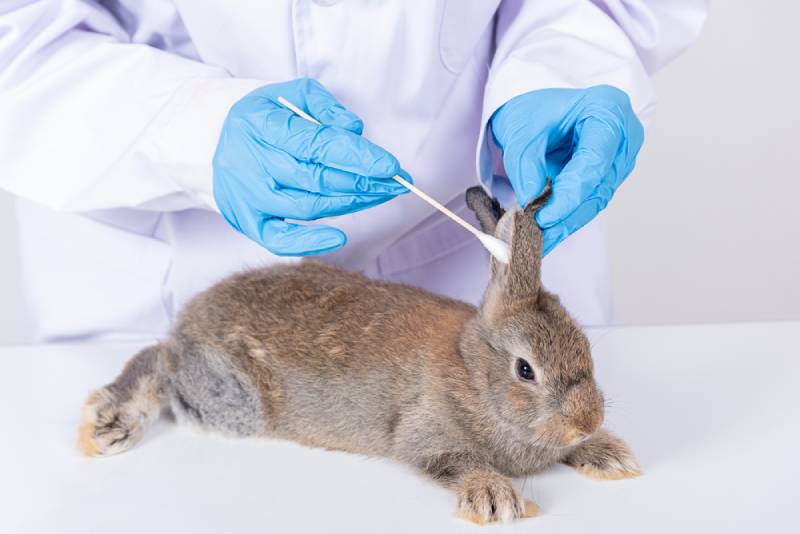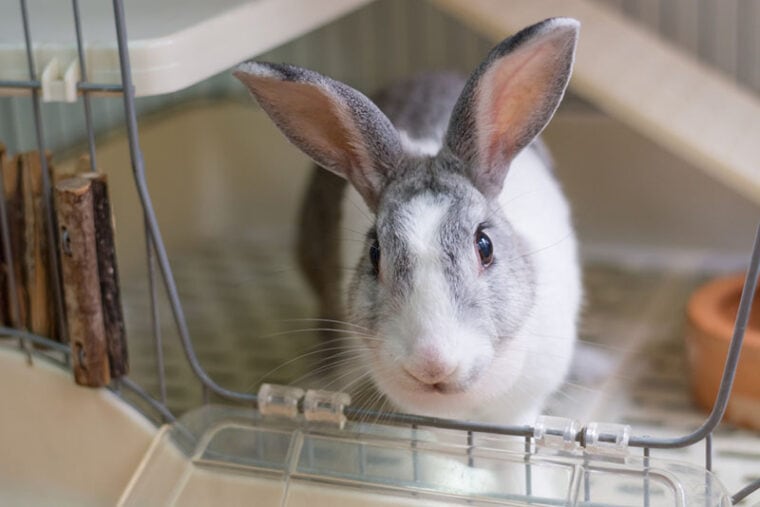
Rabbits stop eating for lots of reasons. But the most important thing to know about a bunny not eating is that it is an emergency. The fact that they are not eating is enough to bring a rabbit to the vet. Not eating can kill a rabbit.
Any disease or health issue can cause a rabbit to feel poorly or cause enough pain to stop eating. The problem is when a bunny stops eating for whatever reason, and they quickly develop another health condition called gut stasis.
Gut stasis can be a cause of not eating, and it can be a result of not eating. And it can be deadly. This listicle will discuss some of the more common causes of gut stasis, but first, let’s explain it.
What Is Gut Stasis?
The gastrointestinal tract of rabbits is designed for grazing all day long. They do not eat discrete meals but nibble on grass all day. When they stop eating, for whatever reason, the GI tract slows down and becomes painful.
Without grass moving through the GI tract, gas builds up inside. The microbiota that naturally live in the GI tract to help digest the tough fibers of grass emit gas as a normal part of breaking down cellulose. When digestion stops moving the gas along, it builds up, blowing the GI tract up like a balloon, which is very painful and further discourages the rabbit from eating.
The ballooning GI tract can get so big it starts to press on the circulatory system and cause a cascade of critical problems that can quickly kill a rabbit.

The 5 Causes of Gut Stasis and Why the Rabbit Is Not Eating
1. Dehydration
Always make sure your rabbit has plenty of clean water that is easily accessible, especially when it is hot. There is this myth among some rabbit people that rabbits get all their water from the grass they eat. This is wildly false, especially since hay is dried-out grass. They need lots of water.
A dehydrated GI tract does not function well and quickly develops gut stasis. And in turn, gut stasis quickly develops with dehydration, which is one of the reasons it’s so deadly.
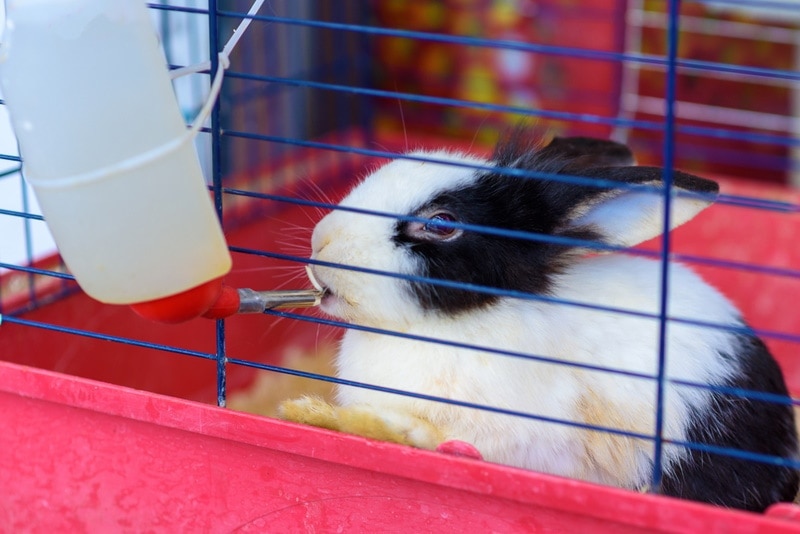
2. Dental Disease
Rabbit teeth are unique, or at least not like the teeth of people, dogs, and cats. Rabbit teeth grow continuously. Even when a rabbit is older, their teeth are still growing. The teeth are supposed to grind against each other, and the fibrous food they eat (stalks of grass/hay) to wear down smooth and clean. This often goes wrong. Here are some of the reasons the rabbit can get a dental disease:
3. Hairballs
Rabbits get hairballs, just like cats. Rabbits are very fastidious and clean their fur almost as much as they chew on hay and grass. Especially if they have long hair, they can swallow too much of it, which develops a fur ball in their stomach.
The hairball basically gets stuck in the tube-like structure of the stomach, often at the end of it, where there is a sphincter that opens and closes to let food pass through to the next part of the GI tract. If food cannot move along the GI tract because it is blocked by a hairball, gut stasis quickly develops.
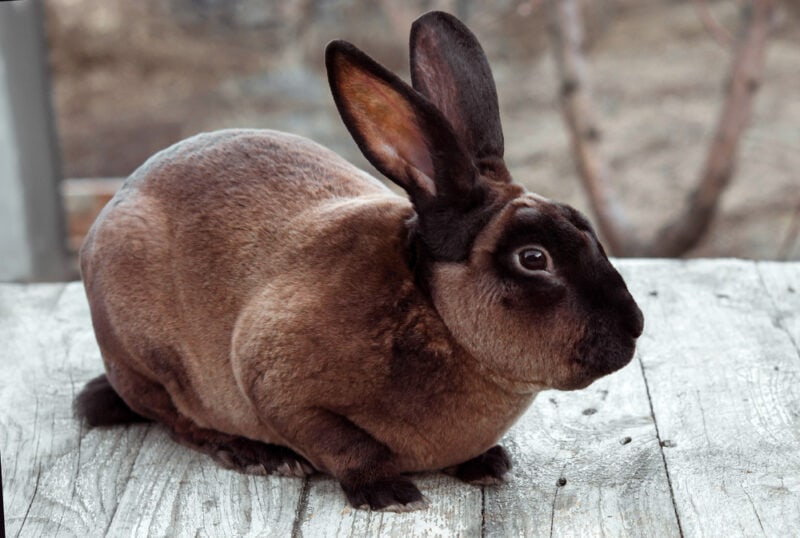
4. Dietary Indiscretion
A rabbit’s diet should be 90% hay. Most of the food they eat should be hay, so they have to chew and grind their teeth a lot. But also, because almost every other type of food is too rich and sugary for their delicate stomachs. This includes pellets, rabbit treats, carrots, strawberries, and just about every other fruit and vegetable. So many bunnies suffer every day from eating too many carrots and pellets.
Carefully control the amount of fruits and vegetables your rabbit eats; only feed less than a third of a cup a day. Also, despite what the manufacturers say, most rabbits do not need many pellets. Most rabbits only need a tablespoon or two a day, especially if they have lots of fresh, clean, healthy hay. Most bunnies are fed a cup or more of pellets which causes all sorts of problems, including gut stasis.
5. Ear Infections
Ear infections are so common in rabbits that even though they rarely cause a rabbit to stop eating, they can cause them to develop some inappetence, which then snowballs into gut stasis. So, while ear infections don’t often cause a rabbit to stop eating, they are so common that it becomes a problem in vet clinics.
With their long floppy ears, it is very difficult for the ears to keep themselves clean and aerated. As a result, they are prone to developing infections caused by either yeast or bacteria. Signs of an ear infection are as follows:
Ear infections need antibiotics or antifungal medication to heal—both of which are only available with a veterinary prescription.
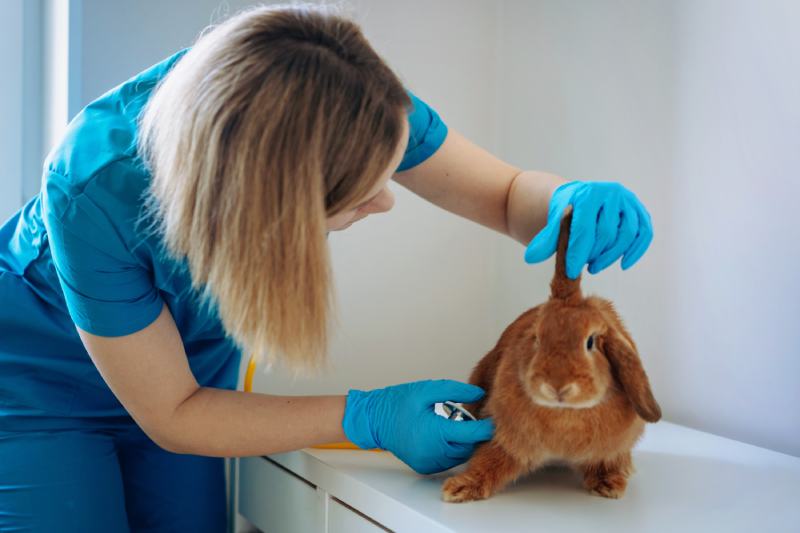
Conclusion
Well, there you have it! About 75% of rabbit medicine is resolving and understanding gut stasis. And, since you also know about dental disease and ear infections now, that’s just about everything about rabbits not eating that you need to know.
Of course, that’s not true. Rabbits are complicated and sensitive souls. They can make loving and entertaining pets that are perfect for apartments and houses alike. And now that you know the importance of gut stasis, making them a safe and healthy home is going to be that much easier.
Featured Image Credit: Kridsada Krataipet, Shutterstock




